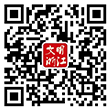诸葛亮、陆游……都给子孙留下了什么家训
南宋以后,20%的家训名篇出自浙江,这些家训的撰写者都是名臣硕儒。很多家训文献都是专门写下来用于训诫家族子弟的传承性文书,因此,内容比较系统,主要围绕修身、治家、处世、教子等几个大的方面,条分缕析,面面俱到。
中华几千年的文明能延续至今,家庭能稳定持续与家庭教育有很大关系。其中,家训是我国古代家族长辈为教育子孙后代而专门撰写的文献。
从周公到孙中山,家训历时3000多年,绳绳相继,积累了众多的家训名篇。不少大型类书里都有收录:《中国丛书综录》收录了117种,《四库全书》收录了171种,《古今图书集成》收录了155种。
传承意义十足的训诫
家训的文献和载体有四种:一是散见于历代文献典籍、人物列传中的训子文,如《尚书》里的周公训辞、《孔子家语》里的过庭训,《宋史》里的包拯家训等;二是历代文人撰写的单篇家训,如北齐颜之推《颜氏家训》;三是《家谱》中的家训族规;四是历代诗词文集中的训子诗。如此,构成了一部完整的中国家庭教育思想史。
很多家训文献都是专门写下来用于训诫家族子弟的承传性文书,因此,内容比较系统,主要围绕修身、治家、处世、教子等几个大的方面,条分缕析,面面俱到。比如,孙奇逢的《孝友堂家规》、司马光的《家范》,甚至连长幼如何行礼、子孙如何祭祀、坟地的树如何栽种、来往亲戚如何接待等,都一条条地加以明确规定。有些家箴类家训,收集了不少警世哲语,加以编排、分类,对今人仍颇有警策意义。如颜之推的《颜氏家训》,除了教子、治家等内容外,还涉及音韵、音乐、风俗等内容,简直可以说是一部中国六世纪时的家教百科全书。
值得一提的是,具有训诫意义的家书是家训文化的重要组成部分。家书因人而异、随事而写、有感而发,尽管不很系统,但富有情感,语义深长,词气真切。今天读来,仍令人有荡气回肠之慨。
在家书中,有的直接点出了训子、诫子的主题,如西汉刘向的《诫子歆书》、东汉郑玄的《戒子益恩书》、三国刘度的《诫弟纬书》、三国诸葛亮的《诫子书》、南北朝徐勉的《诫子崧书》、唐卢氏的《训子崔玄暉书》,唐柳玳的《戒子弟书》、明徐媛的《训子书》、清纪昀的《训次儿书》、清曾国藩的《谕子纪泽书》等。另外一些家书,则是在书信中隐含劝谕训诫之意,如三国虞翻的《与弟书》、唐颜真卿的《与绪汝书》、唐舒元舆的《贻诸弟砥石命》、宋胡安国的《与子书》、明李际阳母的《与子书》、明彭士望的《示儿婿书》、清左宗棠的《致孝威、孝宽》、清张之洞的《与儿书》等。
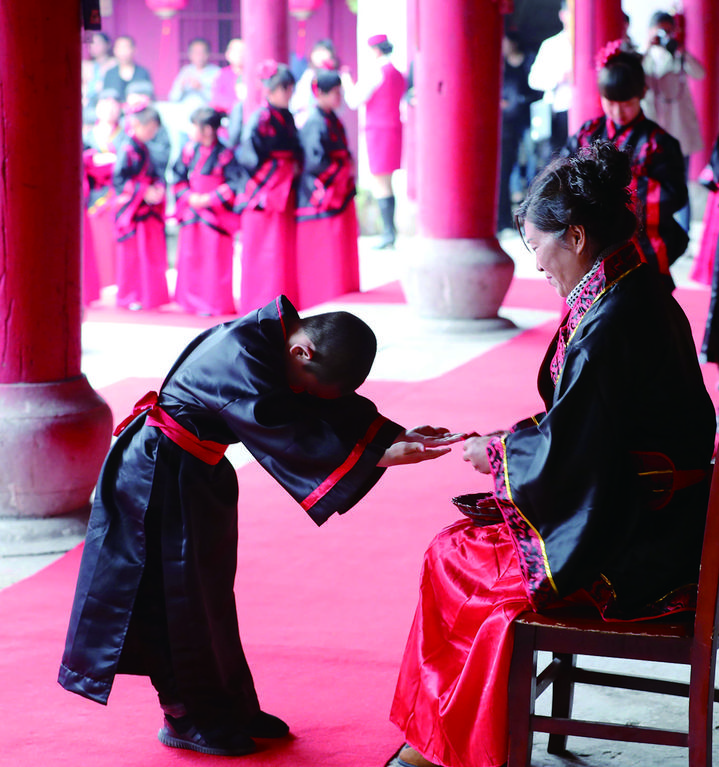
浙江台州各地的顾氏后人齐聚顾氏祠堂,举行台州顾氏家风馆揭牌仪式和祭祖大典,传承家风家训。
训诫类家训针对的对象,一般是家族的所有子孙后辈,旨在世代遵循,世代承传。而家书往往是针对某人某事,用拉家常的口吻以事说理。因此,与板起面孔的训诫相比,家书中的那些娓娓道来的长者之言,更富于感染力。家书中不乏文情并茂的动人之句,如诸葛亮的“非淡泊无以明志,非宁静无以致远”;彭端淑的“学之,则难者亦易矣;不学,则易者亦难矣”;彭士望的“惟勉勉以求益,非汲汲于知名”;纪昀的“事能知足心常惬,人到无求品自高”;左宗棠的“志患不立,尤患不坚”等,都是家书中的训子名言。
浙江大学楼含松教授新近编纂出版的《中国历代家训集成》12册,全文收录历代家训285种,为家训文化的传承和弘扬做了一大功德。
江浙多有家训名篇
南宋建都杭州以后,政治文化的重心也逐渐南移,江浙地区也进入了家训文化发展的繁盛时期。据统计,南宋以后,20%的家训名篇出自浙江,这些家训的撰写者都是名臣硕儒。
爱国不渝的放翁家:陆游,浙江绍兴人,南宋爱国诗人,一生写了9300多首诗,其中训子诗有200多首,他还写了著名的《放翁家训》。
陆游的家训主要包括三方面的内容——
一是表达深深的爱国情怀。陆游出生在北宋亡国之际,国耻家恨与生俱来,他的爱国之情,深切入骨,临终的前一年写下的《示儿》:“死去元知万事空,但悲不见九州同。王师北定中原日,家祭无忘告乃翁。”这堪称是中华民族“第一爱国遗训”。
二是教训晚辈为官清正、造福于民。如《示儿子》:“禄食无功我自知,汝曹何以报明时。为农为士亦奚异,事国事亲惟不欺。”陆游自愧自己无功受禄,训诫子孙们不论务农还是做官,关键是要为国家、为家庭尽心尽责。
三是崇尚道德。陆游很重视气节教育,在《示儿孙》诗中教训儿辈:“为贫出仕退为农,二百年来世世同。富贵苟求终近祸,汝曹且勿坠家风。”这是告诫子孙们要始终保持气节,莫恋富贵,不要玷污了清白家风。
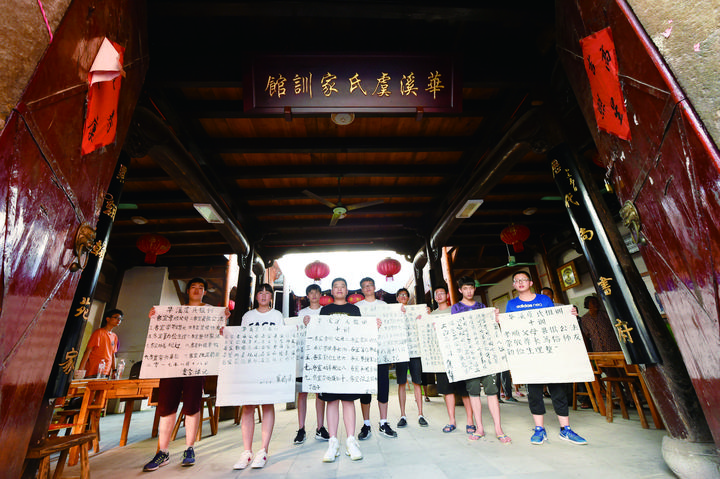
浙江金华举行赛家训活动,大学生毛笔手抄村训后进行展示。
寓教于俗的吕家:浙江金华的吕氏家族,素有撰述家训的传统。早在北宋,仁宗朝宰相吕夷简就作有家训《门铭》,光禄少卿吕希哲著有《家塾广记》,吕本中著有《童蒙训》。
吕祖谦,南宋理学家,与朱熹、张栻并称“东南三贤”,开创了“婺学”之先河,推动了南宋学术的发展和繁荣。他集吕氏家训思想之大成,著有《少仪外传》《家范》《辨志录》等家训。《宋史》赞之为“居家之政,皆可为后世法”。
讲大道理,对三、五岁的小孩不一定有效。吕祖谦就将儒家的伦理思想融入孩童的日常生活进行教育,在《辨志录》中就举了几个很生活化的例子:
“发人私书,拆人私信,深为不德。”
“凡借人书册器用,不加爱惜,至有损坏,乃无德之一端也。”
“凡与人坐,夏则己择凉处,冬则己择暖处;与人共食,多取先者,皆无德之一端也。”
吕氏家族延续百年、人才辈出,清代曾出过十七个进士、五个宰相,如此名门望族,与吕氏家族深厚的家学家风有关。
崇尚俭朴的许家:许汝霖,浙江海宁人,清代康熙朝的著名谏官,官至礼部尚书。他为官清正廉洁,政绩卓著,深得康熙皇帝赞赏,曾御赐“清慎勤”匾额。
许汝霖告老还乡回到老家海宁,便结合自已的为官经历和处世感悟,写下了著名的家训《德星堂家订》,为后代立下规矩,要求子孙后代在宴宾、着装、嫁娶、凶丧、祭祀等方面厉行节俭,所用的鱼、肉、鸡、鸭等,都用本地生产的平常之品,禁止食用燕窝、鱼翅等奢侈品。
许汝霖要求族人凡事一切从简,以朴为美,这和当今提倡的节俭之风异曲同工,许氏家族的后代至今仍传承朴素节俭的家风。
浙江金华举行赛家训活动,大学生毛笔手抄村训后进行展示。
兴学重教的吴家:清代书画家吴昌硕是浙江安吉人,晚年虽客寓上海,但十分重视后代族人的教育。他曾给自已定下一条规矩:凡家族中有人生了孩子,他就托人带回一笔银两,设立教育基金,作为新生孩童以后上学之用。这个义举得到族人的积极响应,他去世后仍代代延续,成了吴氏家族的家规。
辛亥革命后,推行“废科举,兴学堂”新政。1912年春节,吴昌硕回乡过年,与家乡父老商定,借吴氏宗祠作为校舍,建立了孝丰县广安乡初等小学堂,成立了学堂董事会,他带头捐赠了数百大洋,村中士绅纷纷效仿,集资购置教学器材、聘请教师,招收学生。他还倡议将族田作为学堂的固定资产,以维持正常开支,这所学堂就是今天昌硕小学的前身。吴昌硕创办新学的义举,至今仍为乡民所乐道。
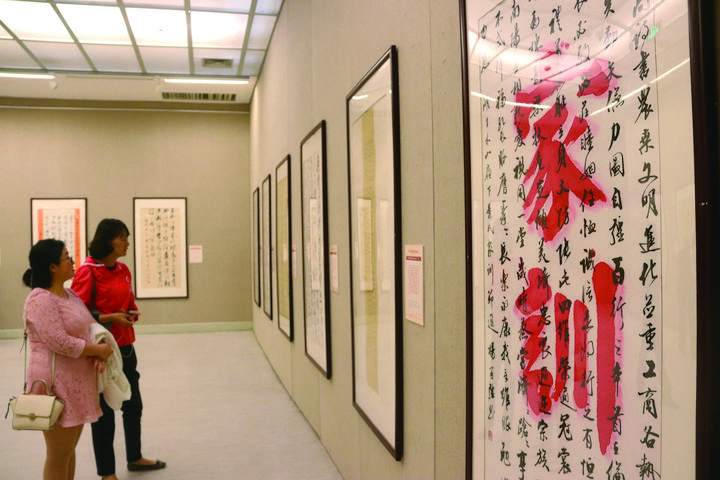
家规家训书法作品。
情怀家国的钱家:杭州临安人钱镠是五代十国时期吴越国的创立者。吴越国建都杭州,所辖疆域相当于今天的浙江、江苏苏州和福建福州。吴越国采取保境安民的治国方针,重农桑、兴水利、发展海外贸易,至公元978年纳土归宋,立国七十二年,使江浙大地获得了较长的稳定发展机遇期。
钱镠晚年立下了《武肃王八训》和《武肃王遗训》,到了清代成为《钱氏家训》。《钱氏家训》共635字,分“个人、家庭、社会、国家”4篇,以修身、齐家、治国、平天下为训诫要义,对钱氏后人产生了深远的影响,形成了“以天下为己任”的家国情怀和优良家风。
自宋代以后,钱氏家族人才辈出,特别是进入现当代,出现了众多著名的政治家、科学家、学者,有人把它概括为“一诺奖、二外交家、三科学家、四国学大师、五全国政协副主席、十八两院院士”,堪称“千古一族”。
钱氏家族传世数十代,经久不衰,英才迭出,究其原因,正如钱伟长先生说的,钱氏家族有《钱氏家训》的指引,重视家教,族人后裔得益很大。
耕读传家的诸葛家:诸葛亮的《诫子书》以“淡泊明志”“静以修身,俭以养德”闻名于世。浙江省兰溪市的诸葛八卦村,是江南诸葛亮后裔的最大聚居地。整个村落建筑格局按“八阵图”样式布列,且保存了大量明清古民居,是著名文化古村落。据传,诸葛亮曾立下“不为良相,便为良医”的祖训,告诫后人:如果成不了辅助国君治理国家的忠臣良相,就种种草药学学中医,做一个为民解除病痛的良医吧。诸葛村的后人们牢记祖训,耕读并重,人才辈出。如今,中医中药仍是诸葛八卦村的特色传统产业。
(本文图片提供:CFP)
Family Mottos Abundant in Zhejiang
One secret of the longevity of Chinese civilization is the stability of families, according to some scholars. And family stability, in the opinion of many scholars, is ascribed to the family tradition maintained in the family mottos written by elders in families and clans in ancient China. The first family motto can be traced to Duke Zhou over three thousand years ago.
Ancient Chinese literature keeps over 100 well known family mottos. They are essentially preserved in four forms: some come down in history in classical documents such as The Book of Documents (first written in over 2,500 years ago) and The History of the Song (a collection of 496 volumes in about 5 million words finished in October, 1345); some appear in long and stand-alone family motto essays; some are documented in family genealogies and clan records; and some were written into poems and have survived in poetry collections. It is said that all these family mottos from the four sources constitute an encyclopedia of family mottos in China.
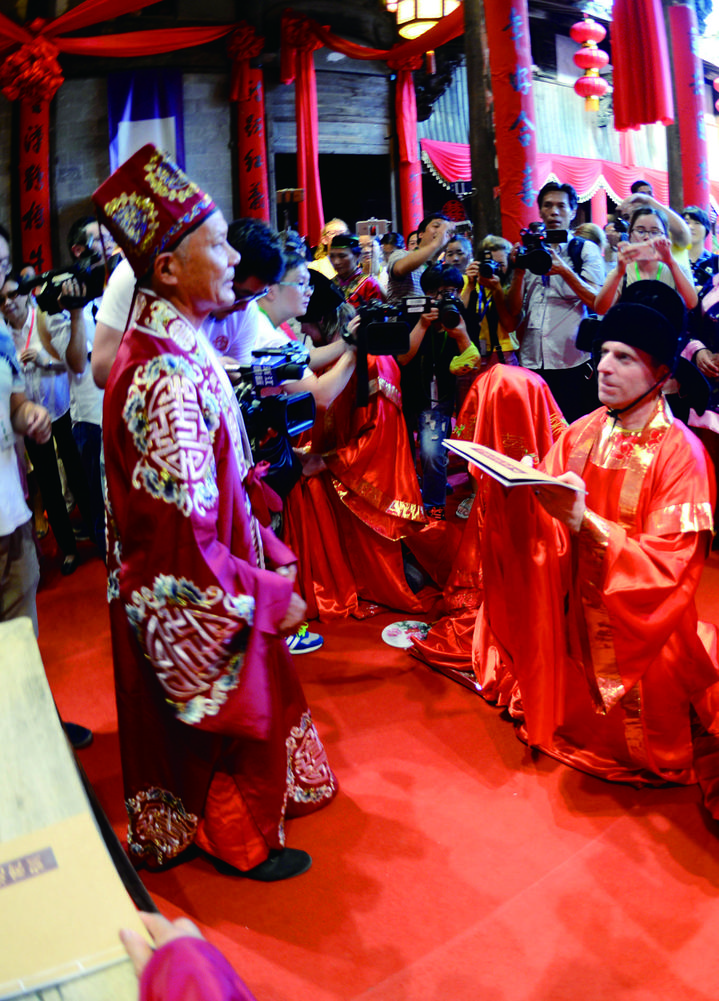
海外学子走进金华武义古村举办传统婚礼。
Family mottos focus largely on important issues. These mottos set up principles concerning how to improve oneself, how to manage family affairs and what family priorities are, how to behave in society and handle human relations, how to give a moral education to children and maintain value, virtue, and etiquette, etc.
Admonitions for the Yan Clan, a book by Yan Zhitui who lived in the sixth century, is widely considered a mini encyclopedia of family mottos in Chinese history. The contents include not only mottos on how to educate children and how to manage family affairs but also instructions concerning music, phonology, and customs.
Professor Han Song of Zhejiang University has just published a 12-book collection of ancient family mottos in China, presenting the full texts of 285 family mottos of the past.
Zhejiang contributes 20 percent of the family mottos in the collection as of the Southern Song (1127-1279), a dynasty set up by the royal house which fled from the north. Zhejiang experienced booming development and became the political, economic and cultural center of the dynasty as present-day Hangzhou served as the imperial capital. Prominent families and important people emerged. Some of them produced family mottoes that go down in history. Lu You (1125-1210), one of the finest poets of the Southern Song, wrote 9,300 poems in his lifetime, over 200 of which were written for his children. In a famous short poem, the poet, knowing he would not live to see the day, instructed his sons to hold a family sacrificial ceremony and send him in the other world a victory message when the emperor’s army recovered the lost land in the central plain.
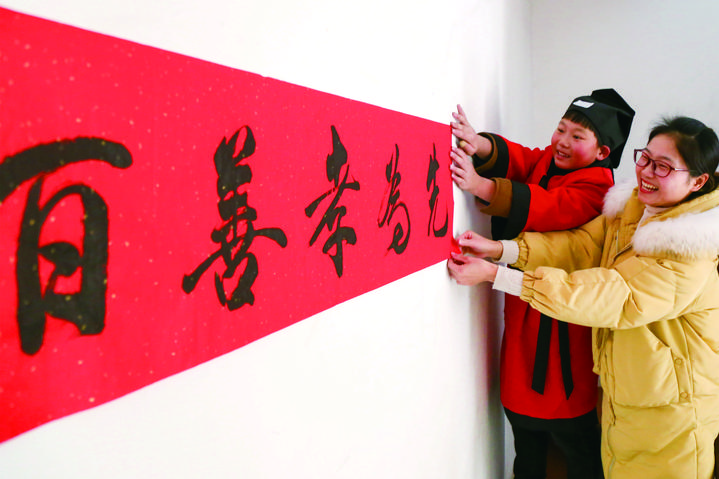
浙江义乌一名小学生和家长一起把家训张贴上墙。
Another big family in Zhejiang was the Lyu clan. Lyu Zuqian (1137-1181), one of the “three great scholars in the southeast” and a prominent figure of a Confucian school of idealist philosophy in the Southern Song, carried on the family mottos from his forefathers and wrote a few essays presenting a long list of dos and don’ts in teaching virtues and values and etiquettes. Aware that youngsters might not understand abstract concepts, Lyu favored detailed instructions. He advised children not to open other people’s letters and asked them to take extreme care of books they borrowed. The prominence of the family lasted for hundreds of years. In the Qing Dynasty (1644-1911) alone, the Lyu clan produced seventeen scholars who won the top Jinshi degree from imperial examinations) and five prime ministers.
Qian Liu, the founder of the Wuyue Kingdom (907-978) with Hangzhou as its capital, bequeathed his descendents with two family mottos, which evolved into The Mottos of the Qian Clan in the Qing Dynasty. The 635-word text focuses on how to improve oneself, how to manage family priorities, how to be a good and honest government official and how to bring peace and prosperity to the nation. In the 20th century alone, the clan produced a galaxy of outstanding personages: a Nobel Prize laureate, two diplomats, three scientists, four masters of national classics, five vice chairpersons of Chinese People’s Political Consultative Committee, eighteen members of China Academy of Sciences and China Academy of Engineering. Qian Weichang (1912-2010), a scientist of mechanics and mathematics, attributed the success of the Qian Family to the 635-word motto.
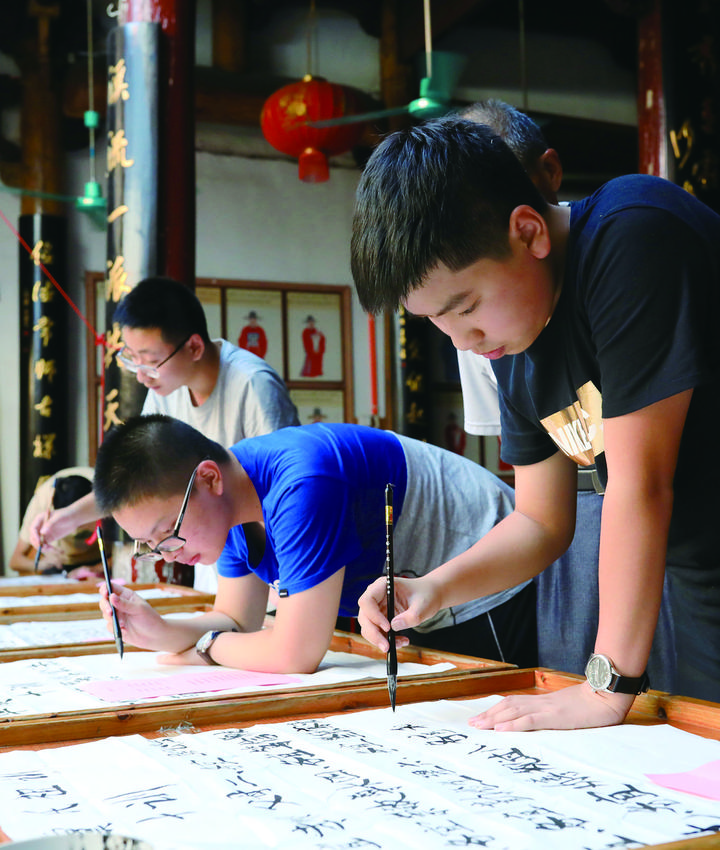
浙江义乌华溪村在虞氏家训馆举行学子抄家训活动。
Zhuge Eight-Diagram Village in Lanxi, Zhejiang is a settlement named after Zhuge Liang, prime minister of the Su Kingdom of the Three Kingdoms period (220-280). Most of the villagers there are descendents of the prime minister and the village is the largest community of the Zhuge descendents in this part of China. Zhuge Liang is famed also for an essay of advices to his children. The village presents a layout patterned after eight diagrams and is now a tourist attraction as quite a few homes built in hundreds of years ago in the Ming and the Qing still stand as a labyrinth where one could easily get lost. Medical herbs are a key pillar of the village’s economy, for the descendents followed the prime minister’s instruction literarily: if you can’t be a prime minister who takes care of state affairs, you can be a fine medical doctor who saves lives and cures people of diseases.
